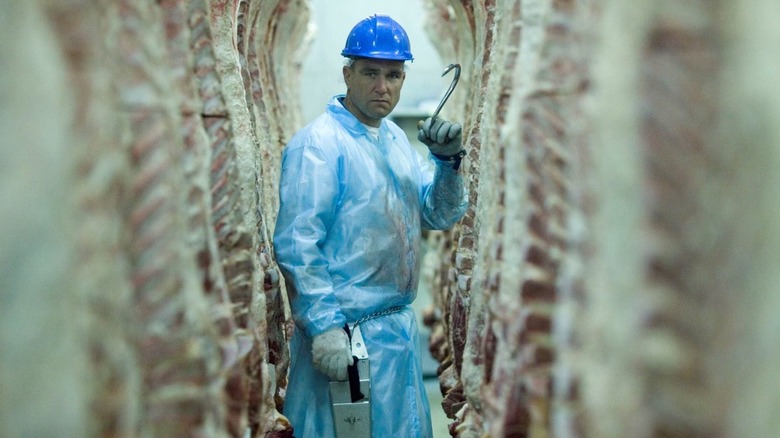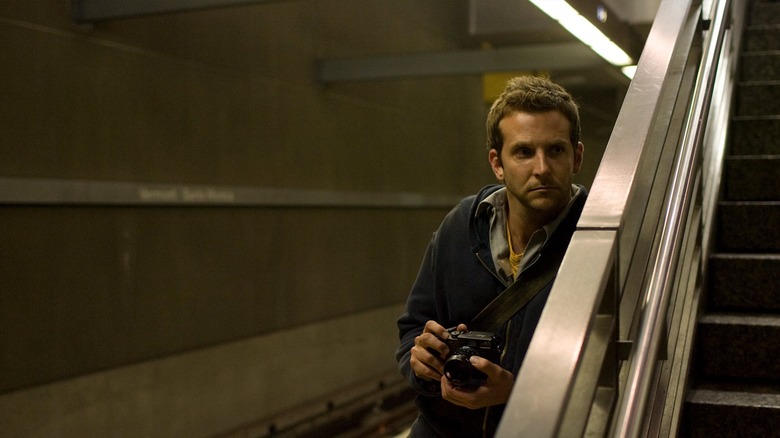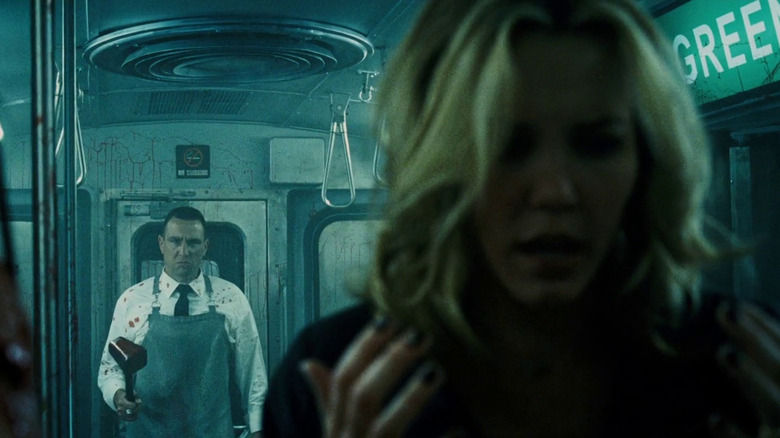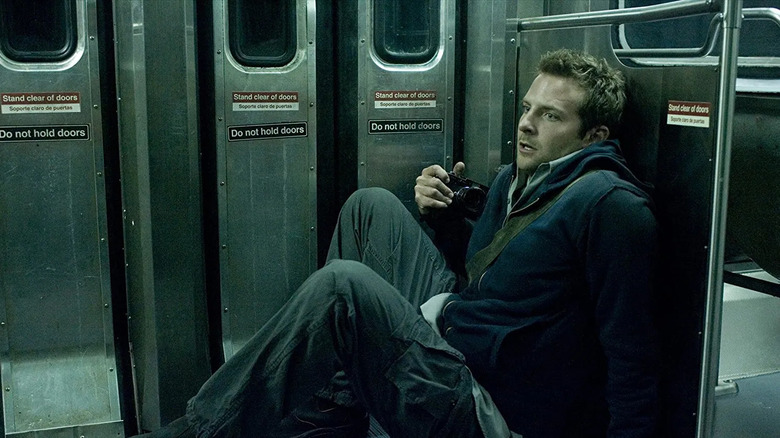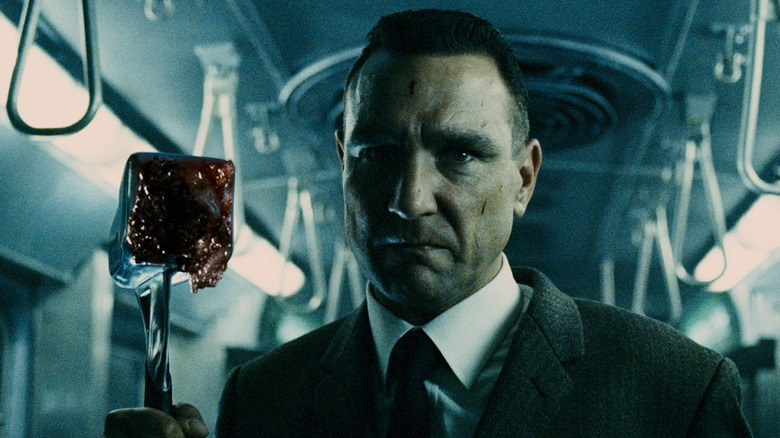The Midnight Meat Train Ending Explained: The City Hungers
Clive Barker's original tale "The Midnight Meat Train" was first published in 1984 as the kickoff story in Volume I of "The Books of Blood," a compendium of the author's short stories. "Midnight Meat Train" was about a British transplant to New York City, a boring office wonk named Leon who instantly becomes disillusioned with the city's overwhelming filth, as well as the reports of a serial killer named Mahogany — aka the Butcher — who has been killing people on subway trains in the middle of the night. Leon falls asleep on the train one night and wakes up to find Mahogany doing his dirty work. Leon manages to fend off and kill the attacking Mahogany but learns there's more to him than mere murder.
It seems that the midnight train to Queens stops at a special disused station where zombie-like monsters board the train and eat the corpses. Also living under the city is a strange monstrous mayor — the Father of Fathers — who helped found New York (!), and who has been feeding on people for centuries. Leon has his tongue ripped out and becomes the new Butcher, sent to kill people and feed them to his new masters. By the end of the story, Leon feels like an insider, happy to serve his city. It's a story about civic pride.
In 2008, director Ryuhei Kitamura and screenwriter Jeff Buhler adapted "The Midnight Meat Train" into a feature film. It starred Bradley Cooper as Leon, now an American photojournalist, and Vinnie Jones as Mahogany. It was relatively well-received and was suffused with the hazy, steely aesthetic that was popular at the time. It briefly made the circuit on the midnight movie scene and is still well-regarded as a minor cult film today.
What you need to remember about the plot of The Midnight Meat Train
The plot of the movie is expanded a little from the short story; it would have to be to accommodate a feature-length running time. In the movie, Cooper plays Leon as a photographer who is keen to eschew commercial work to produce art that is grittier and more dangerous. A gallery owner (Brooke Shields) criticizes him for playing it too safe, so Leon begins hanging out in dangerous areas, hoping to photograph something seedy or criminal. Just like in the original short story, there are legends of a subway-dwelling serial killer who haunts trains late at night.
Leon becomes obsessed with the crime of New York's underbelly, leading him into the bowels of the subway system. Kitamura's film also adds a new character, Leon's girlfriend Maya (Leslie Bibb) who hates that she's losing her boyfriend to a strange, new, dark impulse. Just like the short story, the film is about devotion to New York City and the seedy loyalty its citizens seem to possess. Leon becomes obsessed with unlocking its secrets. When he finally witnesses Mahogany killing people and hanging their corpses on meat hooks, Leon is just as fascinated as he is revolted.
"The Midnight Meat Train" is, as one might predict, a little padded. The short story isn't so complicated that it could comfortably fit into the structure of a three-act movie, so there are long portions where Bradley Cooper descends into madness, as well as serial killer segments where Mahogany takes out multiple commuters. Audiences also see what Mahogany does during the day. It seems that he works as a butcher (natch), and that he — in a weird choice — constantly slices enormous warts and boils off his skin. Gross.
What happened at the end of The Midnight Meat Train?
The end of "Midnight Meat Train" is similar to the end of the short story. Leon kills Mahogany and follows the titular midnight meat train to the end of the line. In Kitamura's version of things, the Leslie Bibb character also meets an unfortunate fate. Leon also learns that a cop named Detective Hadley (Barbara Eve Harris), a character who has been periodically questioning Leon throughout the film, is also in on the murder conspiracy. There are indeed monsters at the final stop, as well as a vast, bone-filled cavern that houses them. There's a lot more action and mayhem in the final fight. Leon kills Mahogany with a loose femur he finds on the ground.
Unlike in the short story, these creatures don't quite emerge, narratively, as the Fathers of the City. They are instead merely creatures who require feeding. Indeed, there's disappointingly little screen time devoted to the creatures, and Kitamura doesn't let the camera linger on them for too long. The way "Midnight Meat Train" looks at its monsters comes across as little more than vermin, a particularly vicious type of rat or cockroach that lives underneath the city. In this way, "The Midnight Meat Train" truly is a New York movie. The City, Kitamura posits, holds secrets no one can truly know, and eats up its citizens. New York is malevolent.
By Barker's estimation, New York does indeed eat up its citizens, but that's presented as a bleakly glorious thing. New Yorkers seem at peace with the blood and hunger of the city itself. It's curious that neither Barker nor Kitamura are New Yorkers. Kitamura is from Osaka, Japan and Barker is from Liverpool, England.
The bowels of the city
But in both the film and the short story of "The Midnight Meat Train," a common theme persists: the city hungers. New York is a cesspool of filth and crime, but, worst of all, it wants flesh. Its subway tunnels are veins, and its trains are merely food delivery systems for creatures that represent the soul of the Big Apple.
Ironically, Kitamura had to move production to Los Angeles and shoot in the then-new L.A. Metro tunnels. Los Angeles eats up its citizens as well, but it doesn't have secret veins under the city and its public transportation systems aren't nearly as vital to its citizens as those in New York. They're also quite a bit worse; the City of Angels hasn't ever really gotten its public transport game together. L.A. trains are getting better, but they're nowhere near as rapid nor as crowded as their east coast counterpart.
Kitamura would have done well to redesign the monsters to look like New York urban animals as well, perhaps to stress that the creatures are outcroppings of the city. In Barker's story, the monsters are more supernatural, human, and ancient. Like a lot of Barker's monsters, they were made of flesh but also somehow semi-divine. Barker likes that sort of thing. In the printed version of "The Midnight Meat Train," people are sacrificed to their ancestors. In the film version, they are meant to keep the wolves at bay.
In both versions, Leon becomes the curator. In the short story, Leon's transformation is instant. In the movie, it's a slow descent into madness, Leon's mind being primed for corruption and service. Mahogany's last word to Leon is "Welcome."
Neither makes New York look like a particularly rosy place to live.
What has the cast and crew of The Midnight Meat Train said about the ending?
When Bradley Cooper starred in David O. Russell's "Silver Linings Playbook" in 2012, the director decided to do the actor a solid and make a fun "The Midnight Meat Train" reference; the film's title can be seen on a theater marquee in the background of one of its scenes. In a 2012 interview with IndieWire, Cooper recalls his conversation with Russell:
"I remember when David asked, 'What do you want the movie to be on the marquee?' And I didn't even know if he was joking or not, but he said, 'What about "Midnight Meat Train'?" [...] And then I show up on set and there it is, with the posters in the entranceway to the theater, too! It was fantastic. You can just almost see it."
Cooper, however, seems to be a little embarrassed by his performance in "The Midnight Meat Train," as he joked that he owned all the copies. No one tell him that the film is on Fubo.
Kitamura, meanwhile, said in a 2023 interview with One Take News that he would love to revisit more Clive Barker stories. He also revealed that he and Barker talked about a "Midnight Meat Train 2." The director said:
"[O]ne day, [Barker] came to the set when I was shooting and he went 'Hey, I came up with the title. 'Butcher's Boy.' 'Butcher's Boy: Midnight Meat Train 2.' that's pretty cool. I don't know, anything is possible in this world so maybe someday?"
No one commented on the ending, but it seems that, if the fates decide, a sequel could one day be in the works.
